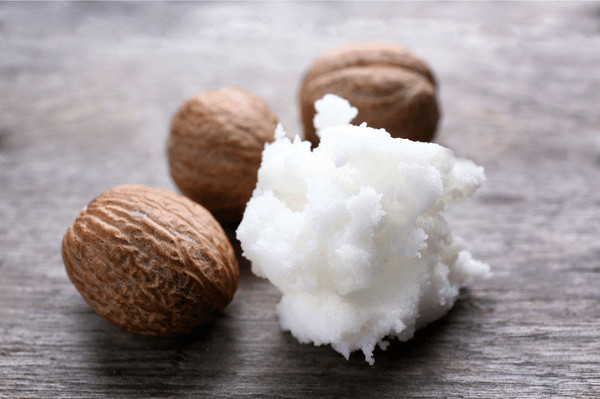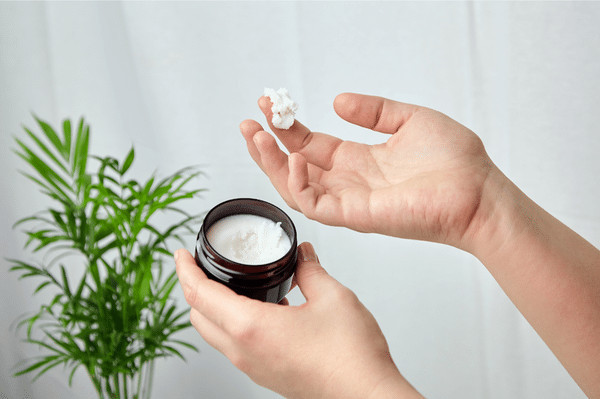Shea butter is an all-natural, nutrient-rich ingredient that works wonders on dry and sensitive skin. But is Shea butter comedogenic? Will shea butter clog pores, that leads to breakouts, blackheads, and acne?
For centuries, shea butter is known for its emollient and healing properties. Some even believe that Cleopatra and the Queen of Sheba used the unrefined shea butter.
This plant-based component comes from the nut of the African shea tree. It has been used for centuries to protect and nourish skin. Today many recognize it as an excellent moisturizer with healing ingredients.
Perfect for moisturizing and illuminating skin, shea butter also helps protect from environmental damage. Another distinctive characteristic is that it is free of harsh ingredients.
How Shea Butter Is Made
Shea butter comes from the seed of the shea tree. This tree grows naturally in the wild, dry Savannah belt of West Africa. It was imported into Britain by 1846.
The kernel is removed from the shea tree seed, ground into powder, and boiled in water. The butter then rises to the top of the water and solidifies.
Shea Butter Characteristics
Shea butter melts at body temperature. It absorbs rapidly into the skin, with good water-binding properties.
- Humectant ingredients attract and retain moisture.
- Occlusive ingredients create a barrier to prevent water loss.
- Emollients smooth in cracks between the skin cells.
The amazing thing about Shea butter is that it does all these things!
Shea Butter Can Be Used Medicinally
Occasionally shea butter is used as a base for medicinal ointments. It has antimicrobial, anti-inflammatory, and emollient properties.
Some people use shea butter to manage sinusitis and relieve nasal congestion. Others massage it into their joints and muscles for pain relief.
Is Shea Butter Good for Eczema?
Shea butter works like an emollient, to soften, or smooth dry skin. It contains substances that can reduce skin swelling in that way it may help treat skin conditions like eczema.
Tips:
Do not expose shea butter to heat or light.
Check the expiration date. It has a two-year or three-year shelf life.
The main ingredient is cinnamic acid. There are different qualities of shea butter, with the highest cinnamic acid content being the highest grade.
Grade A has a nutty aroma which is removed from the other grades. Grade C is pure white. Highly refined shea butter reduces contaminates, but it also reduces its vitamin content.

Features:
- All natural
- Free from harsh chemicals.
- Highly absorbent.
- Rich in vitamins A, E & vitamin F
- All natural, non-greasy formula
- Anti-inflammatory properties to reduce redness & irritation.
- Antioxidants help combat environmental stressors for healthy appearance and restoring glow.
- Helps maintain healthy moisture balance in the skin.
- Nourishes, hydrates, and softens dry areas of the skin.
- Keeps skin feeling soft and supple.
- May help protect skin against environmental pollutants & UV radiation.
Uses of Shea Butter
There are a variety of uses for shea butter. It is frequently found in the skin and hair cosmetic industry.
Good for moisturizing dry, oily, or combination skin types.
Used in hair conditioners for dry and brittle hair.
Manufacturers use it to make massage oil.
Soap makers use it to make a softer soap.
Shea butter soothes skin with dandruff, eczema, and many other conditions.
Benefits
- Shea butter helps reduce the appearance of age spots & wrinkles.
- Leaves skin feeling softer, smoother & more supple.
- Long lasting hydration
- Anti-inflammatory
- Anti-oxidant
- Antibacterial
- Antifungal
- Boosts collagen production.
- Helps promote cell regeneration.
- May reduce appearance of stretch marks and scarring.
- May reduce the appearance of fine lines and wrinkles.
- May help prevent hair breakage.
- Offers additional sun protection.
- Stimulates collagen production for firmer skin.
- And more.
Is Shea Butter Comedogenic?
The term comedogenic means that an ingredient or product causes clogged pores when it is used. Clogged pores can lead to breakouts, blackheads, and acne.
There is a rating scale used to rate products from 0-5, where 0 means non-comedogenic and 5 is the highest rating.
Shea butter has a low rating of 2 out of 5. This means that it can be slightly comedogenic for some people if not used carefully or in moderation.
Shea butter contains both an omega-9 fatty acid and a saturated fatty acid. These ingredients are mildly comedogenic, thus giving it its rating of 2.
Can Shea Butter Clog Your Pores?
While shea butter is non-comedogenic, it can clog pores depending on the user’s skin type and sensitivity. It is best to test out a small sample of shea butter before using it liberally on your face or body.
Occasionally, shea butter may cause skin breakouts. Products that are based on natural ingredients such as jojoba oil, argan oil, or grapeseed oil can be a good substitute for shea butter. These oils are lightweight, non-comedogenic, and help to keep skin hydrated
without leading to breakouts.

How Can You Avoid Acne when Using Shea Butter?
If you are concerned about using shea butter without causing acne, there are a few things you can do:
• Limit your use of shea butter to areas of your body with less active sebaceous glands (the glands which produce oil). Areas such as the arms, legs and feet don’t typically have as many glands, so they won’t get as clogged and oily when exposed to shea butter or other creams/oils frequently topically applied products.
• Keep your face cleansed before applying any products like shea butter. Cleansing helps rid the skin of conditioning oils which might otherwise contribute to blocked pores
• Choose an unrefined form of shea butter, extracted without harsh chemicals. Unrefined versions of this oil are often much more suitable for those prone to acne due to their purity.
Is Shea Butter Good for Your Face?
Instead of using shea butter on your face, you may want something else to prevent outbreaks on your face. You can try some alternative moisturizers like aloe vera gel, jojoba oil, hyaluronic acid serum, and squalane oil. These alternatives all have a zero rating, so they should be less likely to cause problems for facial skin!

Takeaway on Shea Butter and Comedogenicity
Is shea butter comedogenic? Does it clog your pores?
The content of unsaturated fatty acids in unrefined shea butter is what concerns some people.
If you’re looking for a non-comedogenic option, the rating of shea butter is low enough that many people find it beneficial when using in moderate quantities. Most people don’t need to worry that their skin will have many breakouts after using it.
Always make sure that the shea butter you do buy is authentic and sourced organically without any other additives included for smooth, clear skin!
Disclaimer: If you have any concerns or questions about your health, you should always consult with a physician or other healthcare professional. No content on this site should be substituted for direct medical advice from your doctor or other qualified healthcare practitioner. The information contained here is for informational purposes only. It is from my research and personal experience.
Related Posts
Manuka Honey Skin Care Benefits
6 Benefits of Dry Brushing Skin
Top 10 Winter Skin Care Tips to Maintain and Repair Dry Skin Naturally



Thank you for the informative article on shea butter and its comedogenic properties. As someone who struggles with acne-prone skin, I have always been cautious about using skincare products that may cause breakouts.
It’s great to learn that shea butter is a non-comedogenic ingredient and can actually help soothe and moisturize the skin. I appreciate the detailed explanation of what comedogenicity is and how it relates to skincare.
I also found the tips on how to incorporate shea butter into a skincare routine very helpful. I have been hesitant to use pure shea butter in the past because of its thick texture, but I will definitely try mixing it with other oils or using it as a spot treatment.
Hi Dave, thanks for stopping by. I too, like to be careful what I use on my skin. It is great to do some research and find out which skin care products are least likely to cause problems. The Non-comedogenic products have the least amount of irritants to your skin, and the least possibilities of clogging your pores.
Shea butter melts at body temperature, and absorbs rapidly into the skin. It has good water-binding properties, so it would be a good moisturizer for your skin.